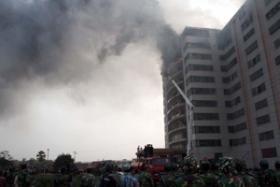WELCOME TO THE ARCHIVE (1994-2014) OF THE MAQUILA SOLIDARITY NETWORK. For current information on our ongoing work on the living wage, women's labour rights, freedom of association, corporate accountability and Bangladesh fire and safety, please visit our new website, launched in October, 2015: www.maquilasolidarity.org
March 22, 2012
The Maquila Solidarity Network (MSN) is pleased to announce that a new agreement has been reached between Bangladeshi and international labour rights groups and trade unions and US-based apparel company PVH (owner of Tommy Hilfiger and Calvin Klein brands) to improve safety at their supplier factories in Bangladesh. The agreement has the potential to save the lives of hundreds of thousands of workers currently at risk.
 This precedent-setting agreement was the result of efforts by a coalition of international organizations including the International Textile, Garment and Leather Workers’ Federation, the Clean Clothes Campaign (Europe), the International Labor Rights Forum and the Worker Rights Consortium (USA), and the Maquila Solidarity Network (Canada), as well as seven Bangladeshi trade unions and NGOs.
This precedent-setting agreement was the result of efforts by a coalition of international organizations including the International Textile, Garment and Leather Workers’ Federation, the Clean Clothes Campaign (Europe), the International Labor Rights Forum and the Worker Rights Consortium (USA), and the Maquila Solidarity Network (Canada), as well as seven Bangladeshi trade unions and NGOs.
The agreement, which we are now urging other major companies to adhere to, sets up a new program for independent building inspections, worker rights training, public disclosure of inspection reports, and a long-overdue review of safety standards. MSN, together with our international labour rights and trade union counterparts, has regularly called attention to the need for structural measures to end the serious and persistent fire and building safety hazards in the Bangladeshi garment industry that have taken so many workers’ lives.
As Scott Nova, from the Worker Rights Consortium says, the agreement is “not another voluntary, non-binding, set of unenforceable corporate promises – it is a binding, enforceable agreement under which the participating brands must open up their factories in Bangladesh to public scrutiny and must make these factories safe.”
There’s more to be done – including ensuring that other major apparel brands whose products are made in Bangladesh agree to fully support and implement the program within their own supply chains. Discussions are already underway with more companies, and we’ll keep you updated as things progress.